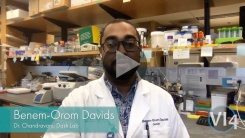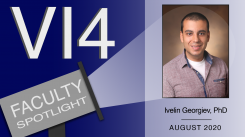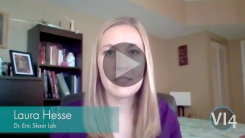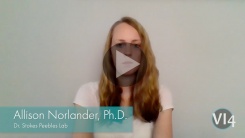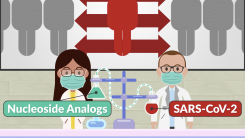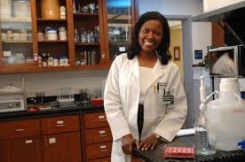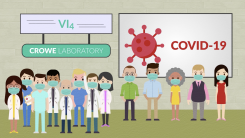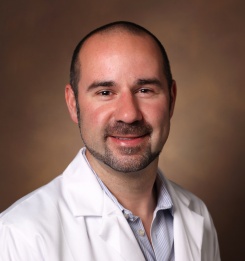VI4 Research Spotlight is where you can find the latest news and happenings at the Vanderbilt Institute for Infection, Immunology, and Inflammation.
Graduate Student Spotlight: Benem-Orom Davids
VI4 Curation Team
August 18, 2020
Benem-Orom Davids is a graduate student at Meharry Medical College. He graduated from Morehouse College in 2011 with his B.S. in Biology, Bioinformatics, and Public Health. He joined the Dash Lab in 2014, where they study the mechanism of HIV-1 replication and pathogenesis... Click the image on the left to continue reading.
Faculty Spotlight: Ivelin Georgiev, Ph.D.
VI4 Curation Team
August 11, 2020
Ivelin Georgiev received his Ph.D. in Computer Science from Duke University. In 2009, he joined the newly formed Structural Bioinformatics Core Section at the Vaccine Research Center (VRC) on the main NIH campus in Bethesda, MD, where he served as a staff scientist and co-head until 2015. Dr. Georgiev is an Associate Director for the Vanderbilt Institute for Infection, Immunology and Inflammation. He is also a faculty member at the Vanderbilt Vaccine Center and an Assistant Professor of Pathology, Microbiology and Immunology and of Computer Science at Vanderbilt.... Click Dr. Georgiev's photo to continue reading.
Graduate Student Spotlight: Laura Hesse
VI4 Curation Team
July 28, 2020
Postdoc Spotlight: Allison Norlander, Ph.D.
VI4 Curation Team
July 21, 2020
Allison Norlander is originally from Pittsburgh, Pennsylvania and received her B.S. in microbiology from the University of Pittsburgh. Allison then earned her Ph.D. at Vanderbilt University studying the impact of salt on T helper 17 cells in hypertension with Dr. Meena Madhur and Dr. David Harrison. She joined Peebles lab in 2017 and currently studies the influence of prostacyclin on T regulatory cells in allergic inflammation... Click the image on the left to continue reading.
Faculty Spotlight: Timothy L. Cover, M.D.
VI4 Curation Team
July 14, 2020
Timothy L. Cover, M.D. is a Professor of Medicine and Pathology, Microbiology and Immunology. Dr. Cover received a B.S. degree in Biology from Muhlenberg College and an M.D. degree from Duke University. Following an Internal Medicine residency at Penn State University, he completed an Infectious Diseases Fellowship at University of Colorado... Click Dr. Cover's photo to continue reading.
Spotlight: Denison Lab
June 17, 2020
Members of the Vanderbilt Institute for Infection, Immunology and Inflammation are making extraordinary advances in health and medicine. VI4 is developing therapies for the treatment of infection, autoimmunity, and cancer. At the frontline of the COVID-19 pandemic is the laboratory of VI4 member, Dr. Mark R. Denison .... Click the image on the left to continue reading.
Faculty Spotlight: Wonder Puryear Drake, M.D.
VI4 Curation Team
June 16, 2020
Wonder Puryear Drake, M.D. is a Professor of Medicine and Pathology, Microbiology and Immunology. Dr. Drake completed her B.S. at the University of Alabama, Tuscaloosa, Alabama and then her M.D. right here at Vanderbilt University. Dr. Drake is interested in exploring the etiology as well as pathogenesis of chronic inflammatory states, particularly sarcoidosis.... Click Dr. Drake's photo to continue reading.
Spotlight: Crowe Lab
May 18, 2020
Members of the Vanderbilt Institute for Infection, Immunology and Inflammation are making extraordinary advances in health and medicine. VI4 is developing therapies for the treatment of infection, autoimmunity, and cancer. At the frontline of the COVID-19 pandemic is the laboratory of VI4 member, Dr. James Crowe.... Click the image on the left to continue reading.
Faculty Spotlight: Carlos Henrique Serezani, Ph.D.
May 12, 2020
Dr. Serezani completed his PhD at the University of Sao Paulo and the University of Michigan. He also completed his postdoctoral studies at University of Michigan. He was an Assistant Professor at Indiana University School of Medicine and has published more than 50 papers in reputed journals. The NIH and other foundations have funded his laboratory for almost 10 years. The Serezani laboratory aims to develop therapeutic strategies to control systemic (sepsis) and localized infections (skin and lung) in healthy individuals, individuals with immune deficiencies, and those suffering from chronic inflammatory diseases, such as diabetes. They have concentrated much of their efforts in understanding the role of the lipid mediators leukotriene B4 and prostaglandin E2 and their actions on microRNAs, epigenetic changes and phosphatases to modulate immune cells involved in the control of microbial infection in these different contexts..... Click Dr. Serezani's photo to continue reading.
Faculty Spotlight: Justin M. Balko, Pharm.D., Ph.D.
April 20, 2020
Justin M. Balko, Pharm.D., Ph.D. is an Associate Professor of Medicine, Cancer Biology and Pathology, Microbiology and Immunology. He received his Pharm.D. from State University of New York at Buffalo and his Ph.D. from the University of Kentucky, Department of Pharmaceutical Sciences. Balko's laboratory is focused on improving treatment outcomes in breast cancer (particularly triple-negative breast cancer) as well as in other solid tumors. To accomplish this, they integrate data from genomic and molecular profiling studies with molecular biology and signal transduction methodologies to translationally identify altered pathways in cancer, the functional consequences of these alterations, and ways to directly target them in patients to improve clinical outcomes and survival. These efforts span in silico (publically available databases), in vitro (cell culture), in vivo (mouse and human clinical studies) and in situ (histology) methods. The lab has a strong interest in the intersection between new immunotherapies and tumor cell signaling pathways.... Click Dr. Balko's photo to continue reading.
